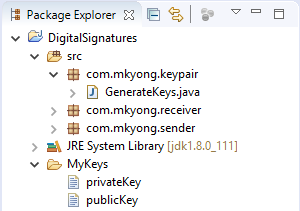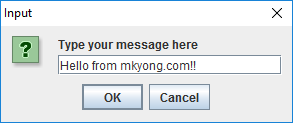Java Digital Signatures example
In Asymmetric Cryptography example we discussed the use of Public Key Pair in Cryptography. Another important use of the Public Key Infrastructure is in Digital Signatures. Digital Signatures are the digital equivalent of handwritten signatures with one important difference; they are not unique but come as a product of the message.
A valid digital signature gives a recipient reason to believe that the message was created by a known sender (authentication), that the sender cannot deny having sent the message (non-repudiation), and that the message was not altered in transit (integrity). (Source: Wikipedia)
1. Generate a Public-Private Key Pair
The code to generate Public-Private Key Pair is identical to the one used in Asymmetric Cryptography example, please refer to Step 1 or download the source code at the end of the article that includes all sources – GenerateKeys.java

2. Sign the message
Next we have to write our message and then sign it. The message and the signature can be separate files but in our example we add them to a List of byte[] and write them as Object to the file.
package com.mkyong.sender;
import java.io.File;
import java.io.FileNotFoundException;
import java.io.FileOutputStream;
import java.io.IOException;
import java.io.ObjectOutputStream;
import java.nio.file.Files;
import java.security.InvalidKeyException;
import java.security.KeyFactory;
import java.security.PrivateKey;
import java.security.Signature;
import java.security.spec.PKCS8EncodedKeySpec;
import java.util.ArrayList;
import java.util.List;
import javax.swing.JOptionPane;
public class Message {
private List<byte[]> list;
//The constructor of Message class builds the list that will be written to the file.
//The list consists of the message and the signature.
public Message(String data, String keyFile) throws InvalidKeyException, Exception {
list = new ArrayList<byte[]>();
list.add(data.getBytes());
list.add(sign(data, keyFile));
//The method that signs the data using the private key that is stored in keyFile path
public byte[] sign(String data, String keyFile) throws InvalidKeyException, Exception{
Signature rsa = Signature.getInstance("SHA1withRSA");
rsa.initSign(getPrivate(keyFile));
rsa.update(data.getBytes());
return rsa.sign();
//Method to retrieve the Private Key from a file
public PrivateKey getPrivate(String filename) throws Exception {
byte[] keyBytes = Files.readAllBytes(new File(filename).toPath());
PKCS8EncodedKeySpec spec = new PKCS8EncodedKeySpec(keyBytes);
KeyFactory kf = KeyFactory.getInstance("RSA");
return kf.generatePrivate(spec);
//Method to write the List of byte[] to a file
private void writeToFile(String filename) throws FileNotFoundException, IOException {
File f = new File(filename);
f.getParentFile().mkdirs();
ObjectOutputStream out = new ObjectOutputStream(new FileOutputStream(filename));
out.writeObject(list);
out.close();
System.out.println("Your file is ready.");
public static void main(String[] args) throws InvalidKeyException, IOException, Exception{
String data = JOptionPane.showInputDialog("Type your message here");
new Message(data, "MyKeys/privateKey").writeToFile("MyData/SignedData.txt");
Output:

Your file is ready.

3. Verify the Signature
The receiver has the file (he knows it is a List of 2 byte arrays; the message and the signature) and wants to verify that the message comes from the expected source with a pre-shared Public Key.
package com.mkyong.receiver;
import java.io.File;
import java.io.FileInputStream;
import java.io.ObjectInputStream;
import java.nio.file.Files;
import java.security.KeyFactory;
import java.security.PublicKey;
import java.security.Signature;
import java.security.spec.X509EncodedKeySpec;
import java.util.List;
public class VerifyMessage {
private List<byte[]> list;
@SuppressWarnings("unchecked")
//The constructor of VerifyMessage class retrieves the byte arrays from the File
//and prints the message only if the signature is verified.
public VerifyMessage(String filename, String keyFile) throws Exception {
ObjectInputStream in = new ObjectInputStream(new FileInputStream(filename));
this.list = (List<byte[]>) in.readObject();
in.close();
System.out.println(verifySignature(list.get(0), list.get(1), keyFile) ? "VERIFIED MESSAGE" +
"\n----------------\n" + new String(list.get(0)) : "Could not verify the signature.");
//Method for signature verification that initializes with the Public Key,
//updates the data to be verified and then verifies them using the signature
private boolean verifySignature(byte[] data, byte[] signature, String keyFile) throws Exception {
Signature sig = Signature.getInstance("SHA1withRSA");
sig.initVerify(getPublic(keyFile));
sig.update(data);
return sig.verify(signature);
//Method to retrieve the Public Key from a file
public PublicKey getPublic(String filename) throws Exception {
byte[] keyBytes = Files.readAllBytes(new File(filename).toPath());
X509EncodedKeySpec spec = new X509EncodedKeySpec(keyBytes);
KeyFactory kf = KeyFactory.getInstance("RSA");
return kf.generatePublic(spec);
public static void main(String[] args) throws Exception{
new VerifyMessage("MyData/SignedData.txt", "MyKeys/publicKey");
Output:
VERIFIED MESSAGE ---------------- Hello from mkyong.com!!
References
From:一号门

COMMENTS